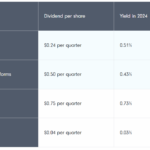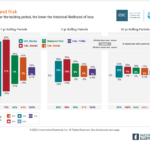Investors in Real Estate Investment Trusts(REITs) are the big winners of new US tax laws. Currently dividends from REITs are taxed as ordinary income for US tax payers. This is substantially higher than taxes on qualified dividends at 10% for investments held for over one year. The ordinary income tax on REITs has also been a big disadvantage on investing in them compared to stocks in other industries. The new tax laws gives a big boost to investment in REITs.
Recently REITs have declined sharply due to rising interest rates and rising yields on treasuries. Since REITs are mostly held for their income, investors have turned bearish on the sectors. For example, Simon Property Group Inc(SPG) has seen its share price fall from over $220 back in July, 2016 to $159 recently. SPG and W.P. Carey Inc(WPC) have yields of 4.89% and 6.17% currently. Investors interested in this sector may want to consider adding some of the REITs especially those in the warehouse area in phases to profit from reduced taxes this year.
Below is a short excerpt from an article on the impact of new tax laws on REITs:
American citizens and corporations are projected to enjoy a net tax benefit of approximately $1.455 trillion over the next 10 years from the new tax law, but those benefits will not be evenly distributed among taxpayers. Still, real estate investment trusts and their investors are incontestable winners.
REITs are professional firms that purchase and operate income-generating properties with capital raised from their shareholders. They are attractive to investors who want the exposure to real estate but may not have the capital or knowledge to invest in properties directly.
Most REITs are structured as pass-through entities to avoid the double taxation of income, as they “pass through” at least 90 percent of the profit and losses to their investors. Investors receive a distribution from REITs either as ordinary income on a 1099-DIV form or as a return of capital. The latter provides tax deferral to investors since the return of capital is not taxed until the properties are sold with a profit. The 25 percent tax rate on the capital gains also could be lower than the income tax rate, which tops out at 37 percent under the old tax code.
The Tax Cuts and Jobs Act blessed REIT investors with a 20 percent tax reduction on the pass-through income received. Specifically, individual REIT investors who file jointly with taxable income less than $315,000, or file individually with income less than $157,000, may enjoy a 20 percent deduction on REIT dividends as qualified business income. REIT investors with higher taxable income — up to $415,000 jointly or $207,000 individually — also may enjoy a tax deduction on a reduced scale. REIT investors facing a high marginal income tax bracket are primary beneficiaries of the tax deduction.
The TCJA’s blessing even spills over to foreign REIT investors. Under the Foreign Investment in Real Property Tax Act, foreign REIT investors formerly were subject to a 35 percent withholding on REIT distributions. Under the new tax code, they are now subject to the corporate tax rate, which tops out at 21 percent.
Source: REITs are the big winners from the new tax law, Accounting Today
For more details on the tax law changes visitors can check out the above linked article.
Disclosure: No Positions



